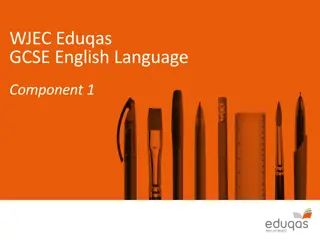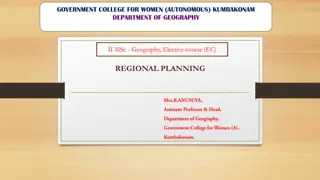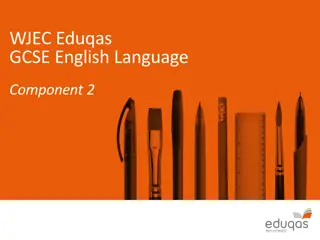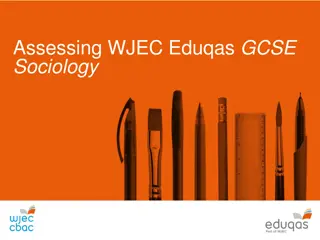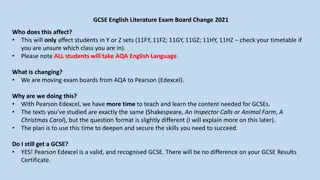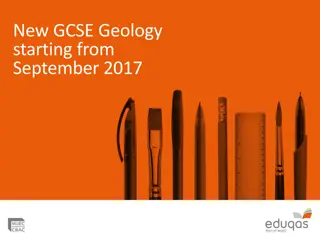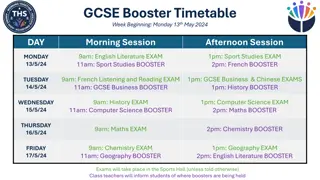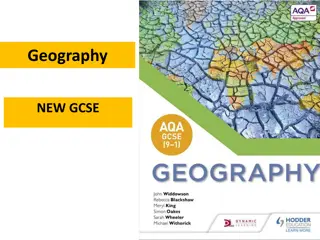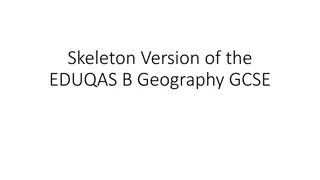Eduqas GCSE Geography B: Course Overview and Changes for 2021
The Eduqas GCSE Geography B qualification emphasizes the development of critical thinking skills and problem-solving abilities in learners. The course is structured to incorporate framed inquiries, fieldwork, and the study of interactions between people and the environment. In 2021, changes have been introduced, such as the removal of written fieldwork declarations and examination questions directly related to students' fieldwork. The overarching ethos is for learners to think like geographers and analyze specialized geographical concepts and issues.
Download Presentation

Please find below an Image/Link to download the presentation.
The content on the website is provided AS IS for your information and personal use only. It may not be sold, licensed, or shared on other websites without obtaining consent from the author. Download presentation by click this link. If you encounter any issues during the download, it is possible that the publisher has removed the file from their server.
E N D
Presentation Transcript
Welcome to our online meeting #eduqasrepteam
Welcome Thank you for attending the Eduqas regional team online session today. Please remember to turn your audio and video off. If you have questions, please use the Chat function or, if this is not available on your device, email us on hugh.lester@wjec.co.uk. We will answer as many as we can in the second half. Sessions on a variety of qualifications and topics continue until December. Follow the Twitter hashtag #eduqasrepteam to find out more. Eduqas regional team: here to support you Email hugh.lester@wjec.co.uk to be put in touch with the rep for your area.
Eduqas GCSE Geography Spec B Information for new centres
The Specification GCSE Specification Version 2 updated Jan 2019 Detailed information and guidance
2021 What is different? What are the changes? What does this mean? There is no requirement for centres to provide a written declaration that students have been given opportunity undertake fieldwork. There is no requirement to complete off site fieldwork. Fieldwork should still integrated into teaching. Some centres may choose to undertake fieldwork on site, in the locality or virtually to prepare students for the assessment. Exam questions will not relate to the student s own fieldwork. There will be no examination questions directly relating to student s own fieldwork on Component 3 (usually the last question in Part A and B). There will be questions related to unfamiliar fieldwork (as in previous examinations) which will assume that student s are acquainted with the enquiry process. The Component 3 paper in 2021 will be 1 hour 15 minutes.
Ethos The overarching ethos of this qualification is that learners should develop the ability to think like a geographer . Learners will develop the skills necessary to conduct framed enquiries in the classroom and in the field in order to develop their understanding of specialised geographical concepts and current geographical issues. Eduqas GCSE Geography B adopts a distinctive problem solving approach to the study of interactions between people and the environment. Learners will develop skills of interpretation, analysis and evaluation when they collect primary data and are presented with reported evidence and information. Therefore, learners will become critical learners as they consider the strengths and limitations of this data and evidence. Eduqas GCSE Geography B also requires learners to consider the points of view of those who have a vested interest when they are affected by contentious geographical change.
Overview The course is divided into the three components (exams), each of the components cover specific themes as well as geographical skills and mathematical techniques: Component 1: Investigating Geographical Issues Component 2: Problem Solving Geography Component 3: Applied Fieldwork Enquiry.
Subject Content is divided into 3 themes Changing Places - Changing Economies Theme 1 Changing Environments Theme 2 Environmental Challenges Theme 3
Theme 1 - Changing Places - Changing Economies This theme covers classic geography of urban environments and development. The emphasis is on how places are changing (on a variety of scales) and solutions to the problems that exist. Key Idea 1.1: Urbanisation in contrasting global cities Key Idea 1.2: Urban and rural processes and change in the UK Key Idea 1.3: A global perspective on development issues Areas of specific study: 1.1 - One city must be located in either a low income country (LIC) or newly industrialised country (NIC). The other city must be located in a high income country (HIC) 1.2 - Study of one location (in the UK) where leisure use is managed and the effectiveness of the management strategy. 1.3 - Countries studied must include the UK and at least one Low Income Country (LIC) and one Newly Industrialised Country (NIC).
Theme 2 - Changing Environments This theme covers classic physical geography. The emphasis being on processes, management and responses to the issues facing us now and in the future. Key Idea 2.1: Shaping the landscape - coasts and coastal management Key Idea 2.2: Shaping the landscape - rivers and river management Key Idea 2.3: Weather and climate Key Idea 2.4: Climate change - cause and effect Areas of specific study: 2.1 - Potential impacts of climate change on coastal communities in at least two countries at different levels of development 2.3 - The features of the hot semi-arid climate (linked to study of hot semi-arid grasslands in 3.1.1) and one other climate zone 2.3 - Study of two contrasting extreme weather events outside of the UK. One event must relate to a dominant high pressure system. One event must relate to an intense low pressure system.
Theme 3 - Environmental Challenges This theme covers various ecosystems and the challenges they face. This theme has an emphasis on the problems facing the environments we depend on and solutions to those problems. Key Idea 3.1: How ecosystems function Key Idea 3.2: Ecosystems under threat Key Idea 3.3: Water resources and management Key Idea 3.4: Desertification Areas of specific study: 3.1 - Must study hot semi-arid grasslands (linked to hot semi-arid climate in 2.3.2 and the relationship between changing climatic patterns and environment in 3.4.1) and one other biome 3.1 - The characteristics of one small scale ecosystem in the UK. 3.3 - Ways in which an imbalance of supply and demand of water can be met within one country at a local scale.
Planning your approach to teaching the themes With the reformed qualifications, the increased amount of content had been an issue for teachers particularly those with a 2 year GCSE. In order to make the most use of lesson time, some areas of content in our themes interlink with each other therefore reducing the amount of time needed to cover these areas. There is a suggested programs of study within the guidance for teaching on pages 6- 22. The document can be found here: https://www.eduqas.co.uk/media/ebjn3as0/eduqas-gcse-geography-b-guidance-for- teaching.pdf These links are detailed on the next slide.
Links between and within themes 2.3 - Linking the features of the hot semi-arid climate and the study of hot semi-arid grasslands in 3.1.1. 2.3 - Temporal and spatial changes in extreme weather to include seasonal and longer term changes in the tropics which result in drought linked to the changing patterns of desertification in 3.4.1. 3.1 - Location of hot semi-arid grasslands linking to the study of hot semi-arid climate in 2.3.2 and to the relationship between changing climatic patterns and the environment in 3.4.1. 3.2 - How processes within the ecosystem have been affected linking to how human activity can contribute to desertification in 3.4.2. 3.2 - The ways in which hot semi-arid grasslands and one other ecosystem have been managed inking to how environments vulnerable to desertification can be managed in 3.4.3. 3.3 - Impacts of increasing demand for water in countries at contrasting levels of development linking to how human activity may contribute to desertification in 3.4.2.
Component 1 - Changing Places - Changing Economies 1hr 45mins, 96 marks, 40% of the qualification Component 1 will assess content from all three themes of the specification. One question, worth 32 marks, per theme. You will find a variety of multiple choice, data response, short open response and extended response questions. At least one open response question will synthesise knowledge and understanding of the UK as a whole. The lower tariff questions (up to 4 marks) will normally cover AO1 and AO4. The longer tariff questions (6 marks+) tend to cover AO2 and AO3. This gives the opportunity for pupils who can explain and justify in detail the opportunity to maximise there marks.
Component 2 - Problem Solving Geography 1hr 30mins, 72 marks, 30% of the qualification Component 2 is set out in a different way to other Geography exams. The main focus is on problem solving an specific issue from the three themes. Part A will introduce an issue and set the context (location and scale). This question will be assessed using multiple choice, data response and short open responses. Part B will outline a number of possible solutions to the issue. This question will be assessed using multiple choice, data response and short open responses. Part C will provide an opportunity for learners to choose a solution and justify their choice following interpretation and analysis of the information and evaluation of the issue. Assessment will be by a longer open response.
Component 2 - Problem Solving Geography 1hr 30mins, 72 marks, 30% of the qualification Part C is where a decision will be made based on the possible solutions (introduced in Part B) to the issue covered in the paper. Typically, learners will have 2 or more possible solutions to base and justify their decision on. The better answers will evidence clear interpretation and analysis of the information provided in the paper and detailed evaluation of the issue and the chosen solution(s). The use of wider geographical knowledge (information that can only come from themselves) also helps to identify a greater understanding. Examples can be seen on the OER: https://oer.eduqas.co.uk/Pages/ProjectByArgs.aspx?subId=28&lvlId=2
Component 3 Applied Fieldwork Enquiry Focus is on the specific fieldwork methodology, representation and analysis. The specific methodology changes every year Part A Question on your own fieldwork Novel contexts Focus on fieldwork enquiry will be used to investigate the specific concept. The specific concept changes every year Part B Question on your own fieldwork Novel contexts Application to broader UK context Part C A decision is made and justified.
Fieldwork approaches 2018-2024 The methodological approach and conceptual frameworks for component 3 change every year and therefore the focus of your 2 sessions of fieldwork will need changing annually. Changing your fieldwork without causing too much work is a challenge. Year of assessment Methodological approach Conceptual framework 2018 Use of transects Sphere of influence 2019 Geographical flows Mitigating risk Sustainability 2020 Qualitative surveys Cycles and flows 2021 Change over time Place 2022 Qualitative surveys Inequality 2023 Use of transects Mitigating risk 2024 Change over time
Fieldwork the straightforward approach The requirement is that learners experience two fieldwork experiences in contrasting environments. The amount of time is not regulated or specified and there are various models you could follow: 1. One day of fieldwork in which the set methodology is used in the morning and the set concept is investigated in the afternoon. 2. Two separate days of fieldwork with a gap of a few weeks between the two trips. 3. A residential fieldtrip of two or more days Given the demands on time in a 2 year GCSE course the most simplistic approach would be to take students out for one day to one location where both environments can be experienced.
Fieldwork the straightforward approach Tips for successful fieldtrips: 1. Pick one location where you have access to contrasting environments (e.g. Blackpool / Brighton sea front) 2. Pick titles that can cover both environments (e.g. How sustainable are the coastal defences at? and Is area y more sustainable than area x?) 3. Look carefully at the data you are going to collect, this isn t controlled assessment! 4. Let the students take some ownership over planning the data collection. It helps them to learn by their mistakes. 5. Follow the guidance in the spec from p24-27. 6. Use published resources for help and the Field Studies Council (FSC) https://www.field-studies-council.org/
Exam questions in Eduqas GCSE Geography The most unique aspect about our qualification is that we have a singular approach to the assessment objectives (AO) meaning each question will only assess one AO at a time. For the higher tariff questions this means that we focus on understanding concepts and evaluating issues rather than knowledge of case studies. Predominately our 8 mark questions focus on AO3 which means pupils need to be able to interpret, analyse and evaluate information and issues and to make judgements. So using resources and pupils own further knowledge and applying them to the question is a vital skill which needs time to develop.
Assessment objectives AO1 Demonstrate knowledge of locations, places, processes, environments and different scales. AO2 Demonstrate geographical understanding of: concepts and how they are used in relation to places, environments and processes the inter-relationships between places, environments and processes. AO3 Apply knowledge and understanding to interpret, analyse and evaluate geographical information and issues and to make judgements. AO4 Select, adapt and use a variety of skills and techniques to investigate questions and issues and communicate findings.
Assessment objectives across the 3 components AO1 AO2 AO3 AO4 Total Component 1 10% 10% 10% 10% 40% Component 2 5% 10% 10%. 5% 30% Component 3 0% 5% 15% 10% 30% Overall 15% 25% 35% 25% 100%
6 mark questions: common approaches These 6 mark questions are marked using a banded mark scheme which is detailed on the next slide. The most successful candidates are able to do the following in order to reach the higher bands: Answer the question fully explain in detail when asked Use subject specific vocabulary specify which pollution/erosion for example Use chains of reasoning to fully explain and link your answers to the question PEE(L) - Pupils do it in English so they can do it in Geography! Pass papers can be found at: https://www.eduqas.co.uk/ed/qualifications/geography- gcse-a/#tab_pastpapers
6 mark questions: banded mark scheme Each question/assessment is marked in three bands, with band 3 being the highest. The key words in each band are as follows: Band 3 Thorough and elaborated understanding Band 2 Elaborated understanding Band 1 Simple and basic
8 mark questions: common approaches These 8 mark questions are marked using a banded mark scheme which is detailed on the next slide. The most successful candidates are able to do the following in order to reach the higher bands: Answer the question fully explain in detail when asked Write a balanced answer I agree 50%, I totally disagree because, etc Apply information from resources and own knowledge to the answers accurately Use chains of reasoning to fully explain and link your answers to the question PEE(L) - Pupils do it in English so they can do it in Geography! Pass papers can be found at: https://www.eduqas.co.uk/ed/qualifications/geography- gcse-a/#tab_pastpapers
8 mark questions: banded mark scheme Each question/assessment is marked in four bands, with band 4 being the highest. The key words in each band are as follows: Band 4 Excellent application, comprehensive and balanced Band 3 Thorough application and balanced appraisal Band 2 Sound application and limited appraisal Band 1 Basic, limited and weak appraisal
Component 3 Part C - 12 mark question The last question pupils will face in their GCSE exams is a 12 mark question. This builds on the content of the component 3 paper and will apply to a broader UK context. This is similar to the legacy spec B decision making exercise. The most successful candidates will need to ensure that: Each option is explored covering at least the advantages and disadvantages of each one A decision is made can be at the start or the end of the answer Apply information from resources and own knowledge to the answers accurately Use elaborate chains of reasoning to fully explain and link your answers to the question PEE(L)
Using the OER in the classroom (and at home!) The Online Exam Review (OER) allows you to look at student responses to past exam paper questions. It can be accessed at: https://oer.eduqas.co.uk/Pages/ProjectByArgs.aspx?subId=28&lvlId=2 These responses have been marked by the principal examiner in detail to demonstrate how the mark scheme has been applied to the answer. You can view these as unmarked and marked. The statistical table at the start of the document shows you have many students answered each question, the mean mark for each question and how accessible that question was (the facility factor ). The left hand menu bar has a range of responses at different levels of achievement. The OER is best viewed once downloaded as a pdf and opened with adobe.
Teaching and Learning Resources The Guidance for Teachers has comprehensive advice and ideas for teaching: https://www.eduqas.co.uk/media/ebjn3as0/eduqas-gcse-geography-b-guidance-for- teaching.pdf We have a number of resources designed to help students and teachers: https://resources.eduqas.co.uk/Pages/ResourceByArgs.aspx?subId=13&lvlId=2 All other key documents (including previous years CPD and key terms for each component) can be found at: https://www.eduqas.co.uk/ed/qualifications/geography- gcse-b/?sub_nav_level=course-materials#tab_resources
Any Questions? Contact our specialist Subject Officers and administrative team for your subject with any queries. Paul.Evans@eduqas.co.uk (Subject Officer) gcsegeographyb@eduqas.co.uk (Subject support team) @eduqas eduqas.co.uk
Thank you Thank you for attending the Eduqas regional team online session today. It would be very helpful if you could let us know your thoughts on the event by responding to the very brief survey here: Find out about future sessions by following the Twitter hashtag #eduqasrepteam Eduqas regional team: here to support you Email hugh.lester@wjec.co.uk to be put in touch with the rep for your area




